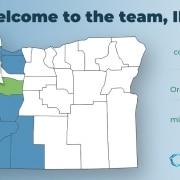CORVALLIS, Oregon – Coalition for a Healthy Oregon (COHO) is pleased to announce that
InterCommunity Health Network (IHN-CCO) has joined its statewide association of coordinated
care organizations (CCOs). COHO members are CCOs that connect members to physical,
behavioral, and dental care in communities across the state. CCOs provide high-quality, locally
controlled health care and wellness services to people who qualify for Medicaid due to low
income or disability.
COHO’s seven CCOs serve more than 282,000 Oregonians, amounting to 39% of CCO members
outside Multnomah, Washington, and Clackamas counties. IHN-CCO serves more than 71,000
Oregonians in Benton, Lincoln, and Linn counties.
“We are pleased to welcome InterCommunity Health Network CCO to the COHO family,” said
Doug Flow, COHO president. “We will all benefit from their unique perspectives and ideas.”
COHO members have been top performers in health quality metrics, which improve population
health while saving taxpayer dollars.
“InterCommunity Health Network shares COHO’s values of advocating for members, fully
funding Medicaid, and maintaining local control,” said CEO Bruce Butler. “COHO is a thought
leader in Medicaid policy, and we will collaboratively continue the hard work of transforming
health care for the benefit of our members.”
IHN-CCO was formed in 2012 by local public, private, and non-profit partners to unify health
services and systems for Oregon Health Plan (Medicaid) members in Benton, Lincoln, and Linn
Counties. IHN-CCO is committed to improving the health of their communities while lowering or
containing the cost of care, coordinating health initiatives, seeking efficiencies through blending
of services and infrastructure, and engaging all stakeholders to increase the quality, reliability,
and availability of care.
COHO has played a key role in the continued evolution of the Oregon Health Plan and health
care policy in Oregon since it was founded in 2005. With the support of its members, COHO is
known for bringing innovative ideas to Oregon health policy.
In the current legislative session, COHO has worked with legislators to advance House Bill 3353,
which asks the federal government for greater flexibility and matching dollars for provider
reimbursement and investments in the social determinants of health. When Oregon faced a
budget crisis due to the COVID-19 recession, COHO was instrumental in providing to state
budget leaders a pathway to maintain Medicaid funding.
About COHO
COHO’s members include Advanced Health (serving Coos and Curry Counties), AllCare Health
(serving Josephine, Jackson, and Curry Counties and parts of Douglas County), Cascade Health
Alliance (serving Klamath County), Trillium Community Health Plan (serving Lane County and
parts of Linn and Douglas Counties), Umpqua Health Alliance (serving Douglas County), Yamhill
Community Care Organization (serving Yamhill County and parts of Washington and Polk
Counties), and InterCommunity Health Network (serving Linn, Benton, and Lincoln counties).
COHO and its partners have helped expand the number of individuals who qualify for the
Oregon Health Plan, promoted primary and preventive care, strengthened wraparound
services, and secured stable health care funding through the passage of provider assessments
and Ballot Measure 101.

